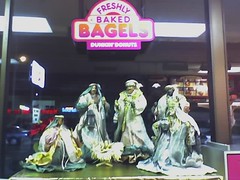The Gates
Michael Kimmelman writes: "The Gates" is a work of pure joy(1), a vast populist(2) spectacle of good will and simple eloquence, the first great public art event of the 21st century.
Pure joy: The orange ribbons basically work off one's sense of wonder, and they succeed at that, for what it's worth. This is also how the artists construe it on their Web site: The Gates will seem like a golden river appearing and disappearing through the bare branches of the trees—it creates or at least evokes images of the improbable. And like a captivating hallucination or anything else that appeals to wonder, it has to be fleeting; it will actually be taken down and the individual pieces recycled. Pure joy? No. Let's say that for what it does, it's good—it looks nice, creates a feeling of warmth (the "good will and simple eloquence" are not off the mark), but it will probably inspire pure joy only when combined with hallucinogenic drugs or religious fanaticism (hey, it would match those robes that Buddhist monks wear). Fair enough.
Populist: This word is a load of crap in most applications. The artists have a certain idea of what a city should look and feel like, and they've been able to carry it out. It's benevolent and generous, and the art has been installed in a considerate manner, according to the artists' Web site. To be "populist," this work has to be pretty accessible. It doesn't have to be dumb but has to have some broad, obvious appeal. That is a standard feature of all public art: it can't be entirely subtle. Hence the gigantic reflective "bean" at Chicago's Millenium Park. It's big and obvious but has an element of wonder to it; the attraction is in its size and shape and warped reflections of people and buildings. The artists' approach is populistic. Populism, like democracy, is a hazy and virtuous word that invokes the percieved bond between millions of people. That bond is itself inarticulate, often poorly qualified. What we get from it is the noble feeling of hearing or saying the word, since an idea is mixed in there somewhere, after all. But the idea is still unclear and can be applied almost any way you dare, and that's why it makes so many people comfortable; it doesn't require answers or explanations. Maybe that's at the heart of the "populism" of works of art like "The Gates": They are enjoyable but entirely undemanding.


0 Comments:
Post a Comment
<< Home